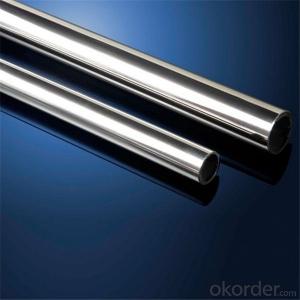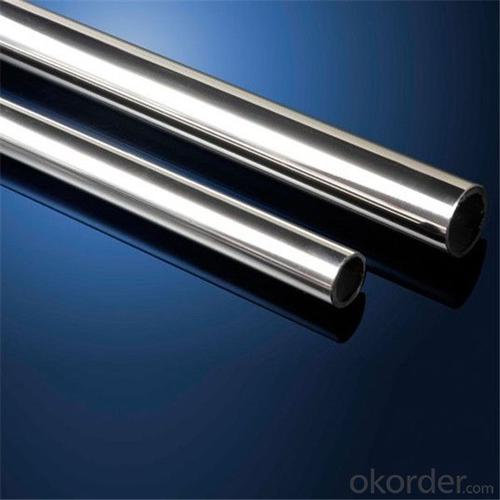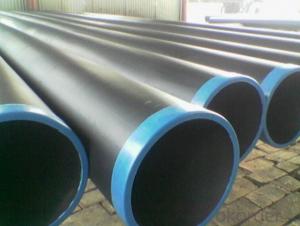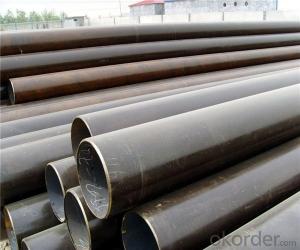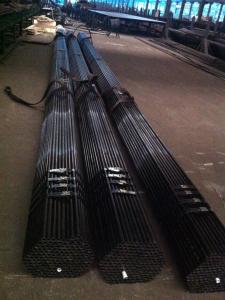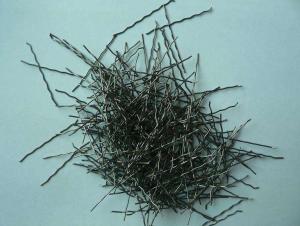Steel pipe with the best quality and price
- Loading Port:
- Tianjin
- Payment Terms:
- TT OR LC
- Min Order Qty:
- 1 pc
- Supply Capability:
- 10000 pc/month
OKorder Service Pledge
OKorder Financial Service
You Might Also Like
Specification
1.Structure of Seamless Pipe ASTM A106/53:
Seamless pipe is formed by drawing a solid billet over a piercing rod to create the hollow shell. As the manufacturing process does not include any welding, seamless pipes are perceived to be stronger and more reliable. Historically seamless pipe was regarded as withstanding pressure better than other types, and was often more easily available than welded pipe.
2.Main Features of the Seamless Pipe ASTM A106/53:
• High manufacturing accuracy
• High strength
• Small inertia resistance
• Strong heat dissipation ability
• Good visual effect
• Reasonable price
3.Seamless Pipe ASTM A106/53 Specification:
Standard | GB, DIN, ASTM ASTM A106-2006, ASTM A53-2007 |
Grade | 10#-45#, 16Mn 10#, 20#, 45#, 16Mn |
Thickness | 8 - 33 mm |
Section Shape | Round |
Outer Diameter | 133 - 219 mm |
Place of Origin | Shandong, China (Mainland) |
Secondary Or Not | Non-secondary |
Application | Hydraulic Pipe |
Technique | Cold Drawn |
Certification | API |
Surface Treatment | factory state or painted black |
Special Pipe | API Pipe |
Alloy Or Not | Non-alloy |
Length | 5-12M |
Outer Diameter | 21.3-610mm |
Grade | 20#, 45#, Q345, API J55, API K55, API L80, API N80, API P110, A53B |
Standard | ASME, ASTM |
1) Material:20#(ASTM A 106/A53 GRB.API5LGRB,GB),45#,16Mn,10#.
2) Specification range:OD:21.3-610mm,WT:6-70mm,length:6-12m or according to the requirement of clients.
3) Excutive standards:GB,ASME API5L.ASTM A 106/A53,Despite of the above standards,we can also supply seamless steel pipe with standard of DIN,JIS,and so on,and also develop new products according to the requirements of our clients!
4) Surface:black lacquered,varnish coating or galvanized.
5) Ends:Beveled or square cut,plastic capped,painted.
6) Packing:bundles wrapped with strong steel strip,seaworthy packing.
4. Application of
Stainless steel pipe is used for structural and piping applications that require the properties that stainless steel delivers – high strength, toughness and excellent corrosion resistance. The pipe is available in sizes 1/2" through 36” in outside diameter (OD) and schedules 05S through 80S and larger for wall thickness (WT). It is available as welded and seamless. Stainless pipe has a dull gray, mill finish.
Seamless stainless pipe is used for applications that require internal pressure within the pipe such as process equipment, water treatment and marine applications. Welded pipe is used for structural applications that are exposed to corrosive environments such as marine and external applications. These include handrails, poles and support piping.
Packaging Details: | seaworthy package,bundles wrapped with strong steel strip |
Delivery Detail: | 50-60days after received 30%TT or Original LC |
6.FAQ of Seamless Pipe ASTM A106/53:
A. How is the quality of your products?
Our products are manufactured strictly according to national and internaional standard, and we take a test on every pipe before delivered out. If you want see our quality certifications and all kinds of testing report, please just ask us for it.
Guaranteed: If products’ quality don’t accord to discription as we give or the promise before you place order, we promise 100% refund.
B.How about price?
Yes, we are factory and be able to give you lowest price below market one, and we have a policy that “ for saving time and absolutely honest business attitude, we quote as lowest as possible for any customer, and discount can be given according to quantity”,if you like bargain and factory price is not low enough as you think, just don’t waste your time.Please trust the quotation we would give you, it is professional one.
C.
Why should you chose us?
Chose happens because of quality, then price, We can give you both.Additionally, we can also offer professional products inquiry, products knowledge train(for agents), smooth goods delivery, exellent customer solution proposals.Our service formula: good quality+good price+good service=customer’s trust
SGS test is available, customer inspection before shipping is welcome, third party inspection is no problem.
Any question, pls feel free to contact us !
- Q: How are steel pipes used in the fabrication of storage tanks?
- Steel pipes are commonly used in the fabrication of storage tanks due to their strength, durability, and versatility. These pipes serve various purposes throughout the tank fabrication process. Firstly, steel pipes are used for the construction of the tank's foundation. They provide a sturdy base for the tank, ensuring stability and preventing any potential structural issues. During the tank fabrication process, steel pipes are also used for the construction of the tank's shell. These pipes are welded together to create a cylindrical structure that can withstand the pressure and weight of the stored material. Furthermore, steel pipes are utilized for the installation of inlet and outlet pipes. These pipes allow for the controlled flow of materials into and out of the storage tank. Additionally, steel pipes are often used for the fabrication of support structures within the tank. These structures help to distribute the weight of the stored material and provide additional reinforcement to the tank. In terms of maintenance and repair, steel pipes are also essential. They are used for the installation of access points, such as manholes or inspection ports, which allow for routine inspections, cleaning, and any necessary repairs. Overall, steel pipes play a crucial role in the fabrication of storage tanks by providing a strong and reliable framework. They are used for the construction of the tank's foundation, shell, inlet and outlet pipes, support structures, and access points. With their durability and versatility, steel pipes ensure the integrity and functionality of storage tanks.
- Q: How are steel pipes measured and labeled?
- Steel pipes are typically measured and labeled based on their outside diameter (OD) and wall thickness. The measurement is usually expressed in millimeters or inches. The label includes these dimensions, such as "2-inch OD, 1/8-inch wall thickness." Additionally, the length of the pipe may also be included in the labeling, ranging from standard lengths like 6 meters or 20 feet.
- Q: How are steel pipes used in the oil and gas industry?
- Steel pipes are widely used in the oil and gas industry for various purposes. They are primarily used for transporting oil and gas from production sites to refineries and distribution centers. These pipes are known for their strength, durability, and resistance to corrosion, making them ideal for handling the high-pressure and corrosive nature of oil and gas fluids. Steel pipes are also used in drilling operations as casing and tubing to maintain the integrity of the wellbore and prevent any leakage. Additionally, steel pipes are utilized in the construction of oil and gas infrastructure such as pipelines, storage tanks, and offshore platforms, ensuring the safe and efficient transportation and storage of oil and gas resources.
- Q: How do you calculate the pipe pressure drop for steel pipes?
- To calculate the pipe pressure drop for steel pipes, you can use the Darcy-Weisbach equation or the Hazen-Williams equation. The Darcy-Weisbach equation is generally more accurate but requires more information. It takes into account the pipe diameter, length, roughness, fluid flow rate, and fluid properties such as viscosity and density. The equation is as follows: ΔP = (f * L * ρ * V^2) / (2 * D) Where: ΔP is the pressure drop f is the friction factor (which can be determined using Moody's chart or by using empirical equations such as the Colebrook-White equation) L is the pipe length ρ is the fluid density V is the fluid velocity D is the pipe diameter The Hazen-Williams equation is a simplified version that is commonly used for water flow calculations. It is less accurate but easier to use. The equation is as follows: ΔP = K * Q^1.85 / (C^1.85 * d^4.87) Where: ΔP is the pressure drop K is the Hazen-Williams coefficient (which depends on the pipe material and roughness) Q is the flow rate C is the Hazen-Williams roughness coefficient d is the pipe diameter It's important to note that these equations provide an estimate of the pressure drop, and actual conditions may vary due to factors such as fittings, bends, and valves in the pipe system. Additionally, it's crucial to ensure that the units used in the equations are consistent (e.g., using SI units or US customary units).
- Q: What are the advantages of PVC pipe and galvanized steel pipe?
- PVC pipeline use temperature is -5 to 90 degrees or so, according to the current market price of around 6000 yuan per ton, the price is cheap. Its corrosion resistance is good, can resist most of the acid and alkali, and unlike the steel pipe that is easy to rust, so in the construction of the upper and lower water pipes and other fields have gradually replaced the trend of steel pipe.
- Q: What is the maximum allowable pressure for steel pipes?
- The maximum allowable pressure for steel pipes depends on various factors such as the type of steel used, the diameter and thickness of the pipe, and the specific application or industry requirements. The American Society of Mechanical Engineers (ASME) provides guidelines and standards for pressure vessel and piping design, including the determination of maximum allowable pressure. ASME B31.1 and B31.3 are widely used codes for power piping and process piping respectively. These codes specify the design criteria for various materials, including steel, and provide formulas and charts to calculate the maximum allowable pressure for different pipe sizes and wall thicknesses. The maximum allowable pressure is typically determined based on the pipe's ability to withstand internal pressure without causing any permanent deformation or failure. It is important to note that the maximum allowable pressure for steel pipes may also be influenced by other factors such as temperature, corrosion, and the presence of any external loads or stresses. Therefore, it is essential to consult the relevant codes, standards, and engineering calculations specific to the application to ensure the safe and reliable operation of steel pipes under the given conditions.
- Q: Can steel pipes be used for underground water supply pipelines?
- Yes, steel pipes can be used for underground water supply pipelines. Steel pipes are commonly used for water supply systems due to their durability, strength, and resistance to corrosion. They can withstand high pressure and are capable of carrying large volumes of water. Additionally, steel pipes are also available in various sizes and thicknesses, allowing for flexibility in designing and installing underground water supply pipelines. However, it is important to ensure that the steel pipes are properly coated or lined to prevent corrosion and maintain the quality of the water being transported. Regular inspections and maintenance should also be conducted to prevent any potential issues with the steel pipes.
- Q: What are the applications of steel pipes?
- Steel pipes have a wide range of applications in various industries due to their durability, strength, and versatility. Some of the common applications of steel pipes include: 1. Plumbing and water distribution: Steel pipes are commonly used in plumbing systems to transport water and other fluids. They are resistant to corrosion and can withstand high pressure, making them ideal for water distribution networks in residential, commercial, and industrial buildings. 2. Oil and gas industry: Steel pipes are extensively used in the oil and gas industry for the transportation of oil, natural gas, and other petroleum products. They are able to handle high-pressure and high-temperature environments, making them crucial in drilling, production, and refining processes. 3. Construction and infrastructure: Steel pipes are widely employed in construction projects for various purposes such as structural support, foundations, scaffolding, and underground piping systems. They provide a strong and reliable framework for buildings, bridges, tunnels, and highways. 4. Industrial applications: Steel pipes are used in various industrial applications such as manufacturing, power plants, chemical processing, and food processing. They are often used to transport liquids, gases, or slurries within the production processes or to transfer heat in heat exchangers and condensers. 5. Agricultural sector: Steel pipes are commonly used in the agricultural sector for irrigation systems, particularly in large-scale farming. They are used to transport water from a water source to the fields, ensuring efficient and controlled water distribution. 6. Mining industry: Steel pipes are utilized in the mining industry for the extraction and transportation of minerals, ores, and other mining materials. They are resistant to abrasion and corrosion, making them suitable for the harsh and demanding conditions of mining operations. 7. Mechanical and automotive applications: Steel pipes find application in the manufacturing of various mechanical components, such as automotive exhaust systems, hydraulic cylinders, and precision tubing. They offer high strength, dimensional stability, and resistance to impact and vibration. 8. Infrastructure and utilities: Steel pipes are commonly used in infrastructure projects for the transportation of sewage, stormwater, and wastewater. They are durable, resistant to chemical corrosion, and can withstand underground conditions, making them suitable for sewer and drainage systems. In summary, the applications of steel pipes are vast and diverse, ranging from plumbing and water distribution to oil and gas industry, construction, agriculture, mining, mechanical and automotive sectors, and infrastructure projects. Their robustness, versatility, and ability to withstand extreme conditions make them a fundamental component in numerous industries.
- Q: What are the different types of steel pipes available in the market?
- There are several different types of steel pipes available in the market, including carbon steel pipes, stainless steel pipes, alloy steel pipes, and galvanized steel pipes. Each type of steel pipe has its own unique properties and uses, making them suitable for various applications in industries such as construction, oil and gas, plumbing, and automotive.
- Q: How do you prevent leaks in steel pipes?
- One way to prevent leaks in steel pipes is by applying a protective coating or lining to the interior surface of the pipes. This can help to prevent corrosion and deterioration, which are common causes of leaks in steel pipes. Additionally, regular inspection and maintenance of the pipes, including checking for signs of damage or wear, can help to identify and address potential leaks before they become a problem.
Send your message to us
Steel pipe with the best quality and price
- Loading Port:
- Tianjin
- Payment Terms:
- TT OR LC
- Min Order Qty:
- 1 pc
- Supply Capability:
- 10000 pc/month
OKorder Service Pledge
OKorder Financial Service
Similar products
Hot products
Hot Searches
Related keywords
